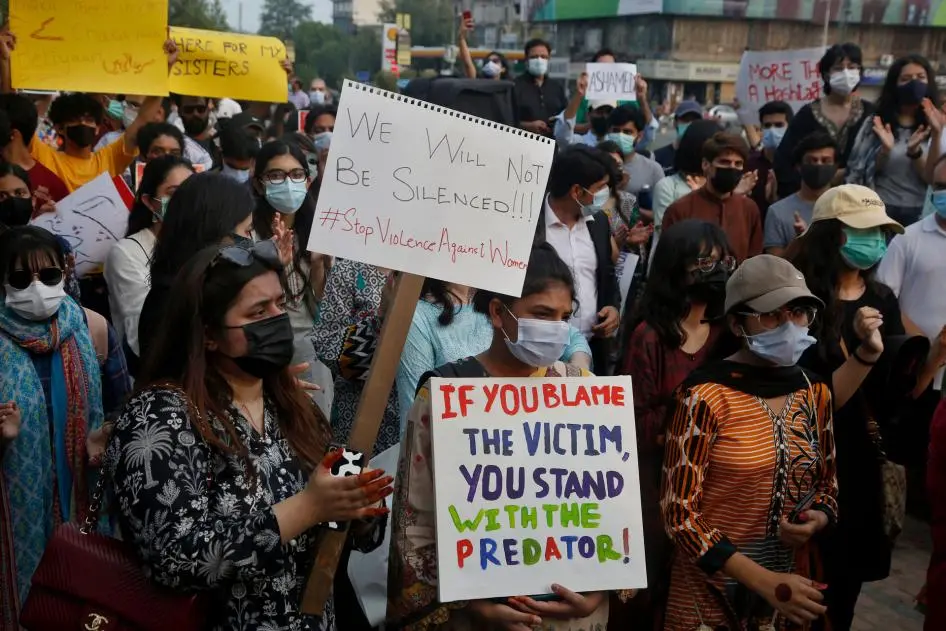Fighting Gender Based Violence: When Will It End?

The recent murder of 17 year old Sana Yousaf received a significant amount of attention both in mainstream media and through social media discussions, as both citizens and advocates against Gender Based Violence expressed shock and concern at how seemingly easy it was to take such a young life.
Sana was murdered by Omer Hayat, an unemployed young man who tried to pursue her, only to turn to violence when his uncalled-for advances were rejected. Her death came shortly after the latest - and hopefully final - verdict in the case of Noor Mukadam’s murder confirmed the death penalty for her murderer Zahir Jaffer, whose case had been going on for four long years.
So what’s missing? Why is it that despite decades worth of advocacy for a safer country for women, and multiple laws - women like Sana Yousaf and Noor Mukadam still lose their lives? Much of the answer lies in the way people talked about both Sana and Noor after their deaths. Most media has been referring to Sana as the “TikToker”, consistently bringing up her career as a content creator on Tik Tok and referring back to the videos she made - which has become a way for many online viewers to justify what was done to her.

Users left comments even on Echoes Media’s coverage of the incident talking about how Sana deserved it, and that this was bound to happen since she was “publically displaying herself” or “asking for it.” This insensitive, and dangerous response to Sana’s murder, along similar responses to Noor’s murder 4 years ago point to a bigger issue in society. In the 4 years since Noor’s death and during the resulting case that continued, supporters of her murderer Jaffer or just critics in general kept arguing that Noor deserved what happened to her because she went to Jaffer’s house on her own. This idea that women deserve violence for living their lives or really any reason critics can think of continues to put the burden of stopping GBV on the victims themselves, which emboldens perpetrators and puts women in further danger.
Until we can change the mindset around gender-based violence, move away from victim blaming, and actively try to stop perpetrators instead, progress will be slow. While advocates and activists in this space have been working on these issues tirelessly for years, there needs to be a greater effort from all of us in understanding and targeting this social evil, long before it reaches the point where someone has to lose a life.

Everyone Can - And SHOULD - Fix The Problem
It’s not that gender-based violence is a problem specific to Pakistan, or even South Asia. In fact it is a horrific reality that women and gender minorities have to face across the globe. But while it’s a global crisis, it can not have a global solution. Cultural norms, expectations and social taboos all play a huge role in silencing victims of gender based violence, and they can only be challenged through local, on-ground solutions and changes that target what the issue is in our specific society.
For decades activists and organisations like Bedari, Aurat Foundation, Shirkat Gah and more have all worked tirelessly to create awareness, help victims of GBV and fight to bring justice to those affected. But lack of support, societal mindsets that talking about such issues is taboo, and disconnect have limited progress to smaller circles. Instead we need to use the resources these organisations have created to build larger conversations, and encourage those around us to be part of the solution.
While the laws may be comprehensive on paper, many organisations report struggles in being able to implement their plans due to lack of funding and resources. Supporting these organisations, and advocating for a Pakistan free of Gender Based Violence starts with challenging conversations and mindsets at the most basic level. Education also plays a big role in these issues, and organisations like Bedari run programmes to educate women and girls to support them later in financial independence and empower them through the classroom. Others like Shirakat aim to make men and boys part of the solution, encouraging awareness and education within their circles to help them understand how they can be part of society in constructive ways without harming those around them.
Sometimes these issues can seem very overwhelming, and as everyday citizens without expertise in this field, we may not know where to start. So if you’re struggling to understand how you can be part of the solution, we’ve put together a few steps you can take to get involved.
Talk About It - often the simplest issue, yet the one we seem to struggle with the most. Abuse and violence are not “ghar ki baat” and need to be brought to light. Normalise talking about these issues and creating safe spaces for survivors to feel like they can seek help.
Support Education Initiatives - it’s not enough to just say you think girls should be educated. Actively be a part of the change. Support schools, education initiatives or even adult literacy programmes. Even better sponsor a student.
Empower Women Through Financial Independence - Most survivors stay in abusive and violent relationships because they have no where else to go. Financial independence, even through seemingly small efforts can be life changing. You can support organisations like Bedari in their financial empowerment programmes or help women you know start earning in whatever way they can.
Understand The Law - the law is there but we often struggle to benefit from it, because we don’t understand it enough. Learn what options are available for survivors so you can help those who need it access the right kind of support.
Build A Network Of Resources - for many of us, social networks or connections are our strong suit. Connect advocates or those working on solutions together to increase their access to communities who need it. Share educational resources and events with your networks to help them gain access to better resources
What tips do you have for everyone to be a part of the solution?
Anmol Irfan is a freelance journalist, editor and the co-founder of Echoes Media. Her work focuses on marginalised narratives in the Global South, looking at gender, climate, tech and more. She tweets @anmolirfan22

Member discussion